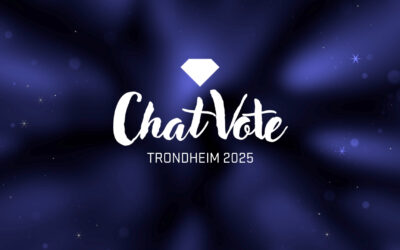At last! That was the general response last year when Anouk dragged the Netherlands through to their first appearance in the Eurovision grand final since 2004 – and all it took was a credible artist singing a good song. Who knew? Now the Dutch are looking to repeat the trick, and maybe even achieve their first back-to-back top ten finish since 1998/99.
The artist internally selected to defend the Dutch colours in Copenhagen is the Common Linnets, a male/female duo consisting of Waylon – not a member of the famous Jennings family, though that’s the inspiration behind his artist name – and Ilse DeLange, who is sufficiently credible and well-established in the country music world that her CDs rub shoulders on the shelves of British music stores with those of Nashville’s biggest stars.
The Dutch entry (also an internal choice) is Calm After The Storm. As the title suggests, it’s three minutes of fairly relaxed, introspective Americana, content to chug along at its own pace and create a distinctive atmosphere through the duo’s close harmonies. As a composition, it actively ignores the typical Eurovision “build” in favour of a mood of, well, understated subtlety. Yes, you read that right: a subtle Dutch entry. A Dutch entry that doesn’t overdo it, try too hard, turn everything up to eleven. Wonders may never cease.
As you might have worked out already, my verdict is an overwhelmingly positive one – this is my favourite song in ESC 2014, and (I like to think) that’s not just because I tend to gravitate towards this kind of genre in my regular music listening. But what can it do on the scoreboard? Well, tapping into an American feel is a dangerous game at Eurovision – the country pastiche of No No Never and even the Katy Perry-inspired Marry Me failed to find much love in a competition where, after all, half of the participating countries were behind a cultural as well as political Iron Curtain not so long ago.
On the other hand, I’m confident that Calm After The Storm transcends its American(a) roots and actually achieves a far more voter-friendly vibe. In a 16-song semi-final and with juries on its side, it’s certainly going to qualify with ease – and in terms of recent parallels, I see no reason it shouldn’t repeat the borderline top ten finish of another quiet, introspective, real-world song with no obvious “Eurovision-ness” about it: namely last year’s Hungarian entry, Kedvesem. Plus the song is in English rather than a notoriously impenetrable language and Hungary is, if anything, even more friendless than the Netherlands when it comes to the ESC scoreboard. So who knows, maybe we’re looking at a really big surprise here?
But either way, nothing could be more surprising than me having a Dutch entry as my personal favourite. And that’s a very nice thing to be able to say about a traditional participant country that was thoroughly lost in the wilderness with the Toppers and the 3JS until recently. Yee-haw and bravo!
Top 10 |
Victory |
Personal |
 |
 |
 |








0 Comments